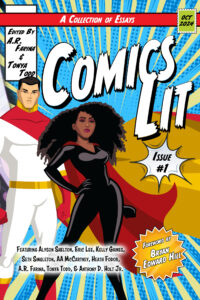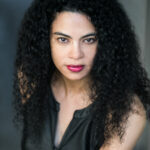Writer Tonya Todd chats with me about her new essay collection, Comics Lit, Volume 1.

Bio:
Tonya Todd is a writer, director, actress, and activist, invested in fair representation in the literary and cinematic worlds she inhabits. When not writing or filmmaking, she works as an inclusive writing instructor, developmental editor, sensitivity reader, and co-host of Femme On Podcast. She served as co-editor and contributor for Comics Lit, Volume 1, an essay collection which highlights the value of comic books as a form of high art. Her anti-censorship series Banned Books Conversations is available on her YouTube channel, and she is gearing up to hit the festival circuit with her directorial debut “Mourning Sacrifice,” based on her short story by the same name.
What do you enjoy most about writing short stories?
That I don’t have to focus on the word count. With short stories, I can use the amount of words I need without altering the text to fit genre expectations.
Can you give us a little insight into a few of your short stories – perhaps some of your
favorites?
Oddly, my favorite is also the one I most wish to revise post-publication. “Mourning Sacrifice” was the first short story I had published, so I was pretty green at that time. But the story is still dear to me—a vampire, posing as a detective, helps the woman he loves search for her missing husband. Last year I made my directorial debut with a short film adaptation of it. I’m looking forward to sharing this version at film festivals in the upcoming year.
What genre are you inspired to write in the most? Why?
Gothic Romance. I love the rich, sensual aesthetic. That, and I’ve always had a thing for tall, dark, and broody.
What exciting project are you working on next?
I’m working on a Dracula retelling from Mina Murray’s perspective. The original epistolary tale offered only the tidbits the characters were willing to commit to paper, which left many elements to the reader’s imagination. In this version, Mina navigates the late Victorian era, concealing her true heritage and hiding the intimate nature of her relationships with two of the characters—truths she never would have shared in letters.

When did you first consider yourself a writer?
After I had written over 200 thousand words of something that started as a piece of fan fiction. I realized, I was doing this writing thing and that it was time to look for a writing group to help me do it better.
How do you research markets for your work, perhaps as some advice for writers?
I’m still relatively new at this, so it’s too early to judge its effectiveness. I check the categories on Goodreads and Amazon of books that might serve as comps and then try to place my work in front of the same readers.
What would you say is your interesting writing quirk?
I don’t really think of my quirks as interesting, but some find it strange that I need to write in a sunless room. I use blackout curtains and keep my door closed. I prefer to write in silence but will listen to music if it sets the mood for the piece.
As a child, what did you want to be when you grew up?
A vampire werepanther with telepathy and telekinesis.
Anything additional you want to share with the readers?
On some level, I am always trying to write the books I could not find growing up. It was impossible to find myself in books when I was young. The only biracial characters were peripheral at best, and never the object of anyone’s interest or affection. Being bisexual made finding representation even harder. This sense of otherness is what fuels my work. Now I write about black/biracial women and the lovers obsessed with them.
Links:
Website | Publisher | Newsletter | IMDb | Instagram | Facebook | Femme On Podcast
